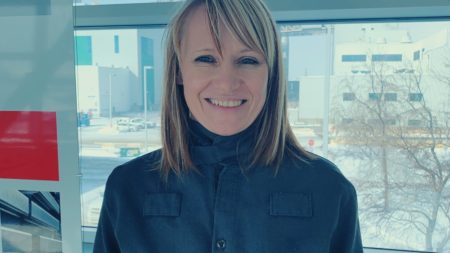Karyne Fortier on the Value of Diversity

Karyne Fortier est chef de service à l’électrolyse à l’usine AP40 (Alma).
With a background in mechanical engineering, Karyne Fortier developed a real penchant for the industrial sector, which she was first exposed to during an internship at Rio Tinto in the early 2000s. As a native of Les Bergeronnes and having completed her studies in Quebec City, she wanted to settle in the region at the time to pursue her career. Today, she is tremendously grateful for the professional opportunities that enriched her career path.
“I consider myself very fortunate. I enjoyed every job I had. Every time I asked for a new challenge, I felt supported and listened to. An organisation like Rio Tinto is a wonderful environment in which to grow,” says Fortier.
Since June 2020, Fortier has been the manager of smelting operations at the AP40 plant in Alma, where she arrived seven years ago. Having previously occupied various positions in different areas of Vaudreuil Works, including maintenance engineer, maintenance coordinator, black belt and superintendent, she never imagined working at a smelter and enjoying it so much.
After graduating from university, Fortier had in mind to work as a project manager or in consulting engineering, mainly because that’s what she was taught. Her first experience working in a plant was quite eye opening and paved the way for her next career steps. “I spent a few months in maintenance, where I got hooked on working in a plant and operational dynamics [. . .]. Things really move! No two days are alike. Everyone has their role to play at different levels, with their talents and strengths, but works toward a common goal. We’re like a small community.”
Fortier’s day-to-day is stimulating. Working for a company as prolific as Rio Tinto allows her to continuously cultivate her interest in her career, and in the industry. There’s no shortage of challenges across the facilities.
“I work with a lot of people in all trades who have different skills and personalities. Being in contact and collaborating with them exposes me to a wide diversity, whether in terms of the tasks you have to learn when you’re starting in a new area or from a human standpoint,” she says.
Since the very beginning, Fortier has worked with mostly male co-workers, but she says that it has never been a problem. “Although that difference exists and was already present when I was completing my bachelor’s degree, I have never felt any pressure as a minority, even though I was clearly outnumbered. I never found it difficult working mainly with men. I interact with everyone the same way, and I never felt that my skills were being called into question because I’m a woman,” she says.
In her opinion, the growing presence of women in the industry, more particularly at Rio Tinto’s facilities, is providing a balance whose value is important. There are currently 15 women among the 200 hourly employees working in smelting operations at Alma Works.
“From our perspective in operations, women are still a minority. What I’ve noticed in the past few years is a willingness to move towards a better balance and greater diversity. More and more women are entering our facilities, which inspires us to think differently about certain work tools, innovate and improve,” says Fortier, visibly confident about the future of the female workforce within the organisation.


